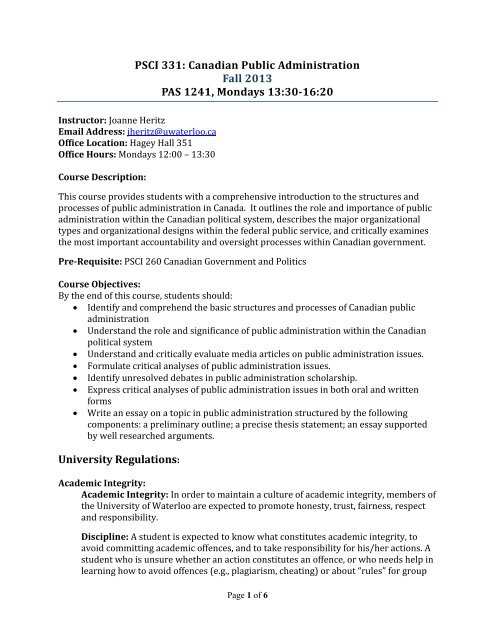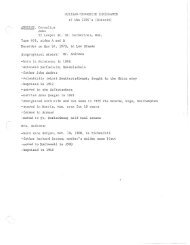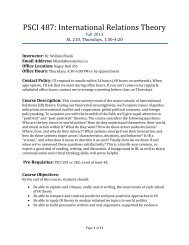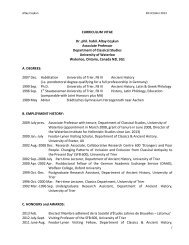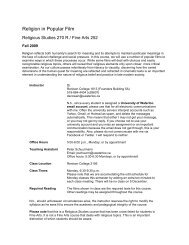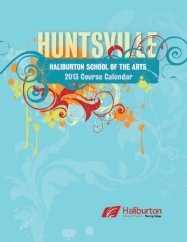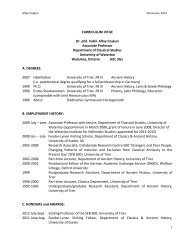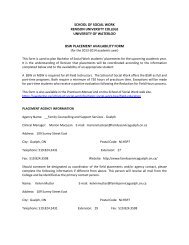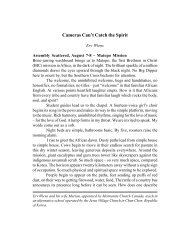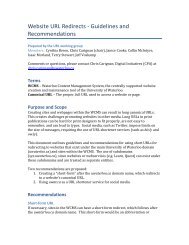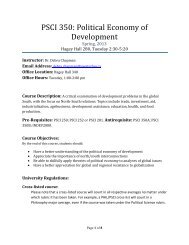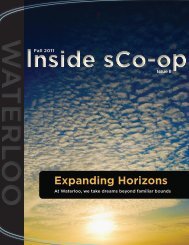PSCI 331: Canadian Public Administration Fall 2013 PAS 1241 ...
PSCI 331: Canadian Public Administration Fall 2013 PAS 1241 ...
PSCI 331: Canadian Public Administration Fall 2013 PAS 1241 ...
You also want an ePaper? Increase the reach of your titles
YUMPU automatically turns print PDFs into web optimized ePapers that Google loves.
<strong>PSCI</strong> <strong>331</strong>: <strong>Canadian</strong> <strong>Public</strong> <strong>Administration</strong><br />
<strong>Fall</strong> <strong>2013</strong><br />
<strong>PAS</strong> <strong>1241</strong>, Mondays 13:30-16:20<br />
Instructor: Joanne Heritz<br />
Email Address: jheritz@uwaterloo.ca<br />
Office Location: Hagey Hall 351<br />
Office Hours: Mondays 12:00 – 13:30<br />
Course Description:<br />
This course provides students with a comprehensive introduction to the structures and<br />
processes of public administration in Canada. It outlines the role and importance of public<br />
administration within the <strong>Canadian</strong> political system, describes the major organizational<br />
types and organizational designs within the federal public service, and critically examines<br />
the most important accountability and oversight processes within <strong>Canadian</strong> government.<br />
Pre-Requisite: <strong>PSCI</strong> 260 <strong>Canadian</strong> Government and Politics<br />
Course Objectives:<br />
By the end of this course, students should:<br />
Identify and comprehend the basic structures and processes of <strong>Canadian</strong> public<br />
administration<br />
Understand the role and significance of public administration within the <strong>Canadian</strong><br />
political system<br />
Understand and critically evaluate media articles on public administration issues.<br />
Formulate critical analyses of public administration issues.<br />
Identify unresolved debates in public administration scholarship.<br />
Express critical analyses of public administration issues in both oral and written<br />
forms<br />
Write an essay on a topic in public administration structured by the following<br />
components: a preliminary outline; a precise thesis statement; an essay supported<br />
by well researched arguments.<br />
University Regulations:<br />
Academic Integrity:<br />
Academic Integrity: In order to maintain a culture of academic integrity, members of<br />
the University of Waterloo are expected to promote honesty, trust, fairness, respect<br />
and responsibility.<br />
Discipline: A student is expected to know what constitutes academic integrity, to<br />
avoid committing academic offences, and to take responsibility for his/her actions. A<br />
student who is unsure whether an action constitutes an offence, or who needs help in<br />
learning how to avoid offences (e.g., plagiarism, cheating) or about “rules” for group<br />
Page 1 of 6
work/collaboration should seek guidance from the course professor, academic<br />
advisor, or the Undergraduate Associate Dean. When misconduct has been found to<br />
have occurred, disciplinary penalties will be imposed under Policy 71 – Student<br />
Discipline. For information on categories of offenses and types of penalties, students<br />
should refer to Policy 71 - Student Discipline, Student Discipline<br />
http://uwaterloo.ca/secretariat/policies-procedures-guidelines/policy-71.<br />
Grievance: A student who believes that a decision affecting some aspect of his/her<br />
university life has been unfair or unreasonable may have grounds for initiating a<br />
grievance. Read Policy 70 - Student Petitions and Grievances, Section 4, Student<br />
Petitions and Grievances http://uwaterloo.ca/secretariat/policies-proceduresguidelines/policy-70.<br />
In addition, consult Student Grievances<br />
http://arts.uwaterloo.ca/student-grievances-faculty-arts-processes for the Faculty of<br />
Arts’ grievance processes.<br />
Appeals: A student may appeal the finding and/or penalty in a decision made under<br />
Policy 70 - Student Petitions and Grievances (other than regarding a petition) or<br />
Policy 71 - Student Discipline if a ground for an appeal can be established. Read Policy<br />
72 - Student Appeals, Student Appeals http://uwaterloo.ca/secretariat/policiesprocedures-guidelines/policy-72.<br />
Academic Integrity website (Arts): Academic Integrity<br />
http://arts.uwaterloo.ca/arts/ugrad/academic_responsibility.html<br />
Academic Integrity Office (uWaterloo): Academic Integrity Office<br />
http://uwaterloo.ca/academic-integrity/<br />
Accommodation for Students with Disabilities:<br />
Note for students with disabilities: The AccessAbility Services (AS) Office, located<br />
in Needles Hall, Room 1132, collaborates with all academic departments to arrange<br />
appropriate accommodations for students with disabilities without compromising the<br />
academic integrity of the curriculum. If you require academic accommodations to<br />
lessen the impact of your disability, please register with the AS Office at the beginning<br />
of each academic term.<br />
Texts:<br />
Leone, R. & F. Ohemeng,. Approaching <strong>Public</strong> <strong>Administration</strong>. Toronto: Emond Montgomery.<br />
2010. (Required)<br />
Barker, P. <strong>Public</strong> <strong>Administration</strong> in Canada, Brief Edition. Toronto: Thomson Nelson. 2008.<br />
(Recommended)<br />
Texts are available for purchase at the University of Waterloo bookstore.<br />
Course Requirements, Expectations, and Standards:<br />
Course Evaluation:<br />
Discussion Comments/Questions due weekly 20%<br />
Essay Outline Deadline October 21 10%<br />
Page 2 of 6
Essay Due November 18 30%<br />
First Test October 7 20%<br />
Second Test December 2 20%<br />
Assignments:<br />
Discussion Comments/Questions 20% - Due each week at the beginning of class<br />
Students are expected to come well prepared for class by submitting a hard copy of<br />
comments/questions on the week’s topic at the beginning of class, completing the weekly<br />
readings and reflecting upon issues and questions that will stimulate discussion. Students<br />
are expected to be active participants, making weekly contributions to discussions.<br />
Essay Outline 10% Deadline October 21 (outlines will not be accepted after this date)<br />
To facilitate and improve essay development, each student is required to submit one essay<br />
outline no later than October 21st that includes the following:<br />
A draft introductory paragraph stating the topic of the paper.<br />
A clear, concise, and meaningful thesis statement.<br />
At least three supporting arguments that will be used to help prove the essay’s thesis. Each<br />
argument must be referenced.<br />
A bibliography with a minimum of five scholarly sources not including the course texts.<br />
The outline should be approximately two pages in length, double-spaced.<br />
Essays 30% Due November 18th<br />
Students in this course are required to complete one research essay. This essay will be<br />
approximately 2,000 words in length and is due on November 18 th in class. This due date is<br />
firm and it is the responsibility of students to plan ahead and submit their paper on time<br />
(see below for the policy on late essays). Papers will not be accepted after December 2 nd<br />
without documentation. All essays are to be written in formal academic style, must be fully<br />
referenced and should include a title page featuring an original title.<br />
The essay assignment is restricted to the weekly topics in the course outline only.<br />
The thesis for the essay will specifically address the question posed on the weekly topic.<br />
The readings for the weekly topic will be an initial starting point for your research, but at<br />
least five additional scholarly sources are required for the essay assignment. Your essay<br />
should be analytical (not just descriptive) and should develop an original thesis aimed at<br />
resolving your chosen topic question.<br />
Tests & Examinations:<br />
Tests 20% each: Test One: October 7 and Test Two: December 2<br />
There will be two in-class tests. The first test will be on October 7 and will cover the course<br />
material and lectures to date. The second test will be on December 2 and will cover the<br />
course material and lectures for the second half of the course. Students will be graded on<br />
their ability to analyze and comprehensively synthesize the course material.<br />
Page 3 of 6
Late Policy:<br />
Weekly Discussion Comments/Questions submissions will be accepted at the beginning of<br />
class only. Email submissions will not be accepted unless students provide documentation.<br />
The Essay Outline will not be accepted after October 21. The Final Essay is due on<br />
November 18th in lecture. A penalty of 2% per day will be applied to late essays. The final<br />
date for Essay submission is December 2. Only essays with documentation will be accepted<br />
after December 2.<br />
Schedule:<br />
Week 1<br />
September 9 – Introduction<br />
Lecture: Forsey, Eugene. How <strong>Canadian</strong>s Govern Themselves:<br />
http://www.parl.gc.ca/about/parliament/senatoreugeneforsey/book/assets/pdf/H<br />
ow_<strong>Canadian</strong>s_Govern_Themselves8.pdf<br />
Week 2<br />
September 16 - Politics and <strong>Public</strong> <strong>Administration</strong> in Canada<br />
Lecture: Barker, Chapter 1<br />
Kernaghan, Kenneth. A Special Calling: Values, Ethics and Professional <strong>Public</strong> Service:<br />
http://www.tbs-sct.gc.ca/rp/scv-eng.pdf<br />
Discussion Topic: Do politicians or administrators really control government?<br />
Reading: Leone & Ohemeng, Chapter 2<br />
Week 3<br />
September 23 - Bureaucracy<br />
Lecture: Barker, Chapters 2 - 3<br />
Discussion Topic: Should the Bureaucracy be Politically Neutral?<br />
Reading: Leone & Ohemeng, Chapter 3<br />
Week 4<br />
September 30 - New <strong>Public</strong> Management and Alternative Service Delivery in Canada<br />
Lecture: Barker, Chapter 4 and Chapter 8<br />
Discussion Topic: Should governments use the private sector to deliver public<br />
services?<br />
Reading: Leone & Ohemeng, chapter 10<br />
Week 5<br />
October 7 – eGovernment<br />
Lecture:<br />
Kernaghan, Kenneth. <strong>2013</strong>. “Changing channels: Managing channel integration and<br />
migration in public organizations.” <strong>Canadian</strong> <strong>Public</strong> <strong>Administration</strong>. 56 (1) (March<br />
<strong>2013</strong>): 121-141.<br />
Roy, Jeffrey. 2008. “Beyond Westminster governance: Bringing politics and public service<br />
Into the networked era.” <strong>Canadian</strong> <strong>Public</strong> <strong>Administration</strong>. 51 (4) (December 2008):<br />
Page 4 of 6
541-568.<br />
Discussion Topic: Is E-government Radically Transforming <strong>Public</strong> <strong>Administration</strong>?<br />
Reading: Leone & Ohemeng, chapter 12<br />
TEST ONE HELD DURING SECOND HALF OF CLASS – OCTOBER 7<br />
Week 6 - October 14 – Thanksgiving Day – No Class<br />
Week 7<br />
October 21 -Overview of the <strong>Canadian</strong> <strong>Public</strong> Service: Structure and Organizations<br />
Lecture: Barker, Chapters 5 – 7<br />
Discussion Topic: Should governments increase their efforts to recruit young people<br />
into public service careers?<br />
Reading: Leone & Ohemeng, Chapter 18<br />
ESSAY OUTLINE - DEADLINE OCTOBER 21<br />
Week 8<br />
October 28 – Ministerial Responsibility: Evolution or Irrelevance?<br />
Lecture: Barker, Chapters 11 - 12<br />
Discussion Topic: Should whistleblowing be encouraged in the public service?<br />
Reading: Leone & Ohemeng, Chapter 8<br />
Week 9<br />
November 4 - Parliamentary and <strong>Public</strong> Oversight of the <strong>Public</strong> Service<br />
Lecture: Barker, Chapter 13<br />
Discussion Topic: Is ministerial responsibility a dead concept?<br />
Reading: Leone & Ohemeng, Chapter 5<br />
Week 10<br />
November 11 - Managing <strong>Public</strong> Money<br />
Lecture: Barker, Chapters 19 - 20<br />
Discussion Topic: Should <strong>Canadian</strong> governments be required by law to run balanced<br />
budgets?<br />
Reading: Leone & Ohemeng, Chapter 9<br />
Week 11<br />
November 18 - Social Equity in the <strong>Public</strong> Service<br />
Lecture: Barker, Chapters 17 - 18<br />
Discussion Topic: Is employment equity fair and necessary?<br />
Reading: Leone & Ohemeng, Chapter 11<br />
ESSAY DUE IN CLASS NOVEMBER 18<br />
Week 12<br />
November 25 – Intergovernmental Relations and Nongovernmental Actors<br />
Lecture: Barker, Chapters 15- 16<br />
Discussion Topic: Is the public service more vulnerable to political pressure?<br />
Reading: Leone & Ohemeng, Chapter 13 and Chapter 15<br />
Page 5 of 6
Week 13<br />
December 2<br />
TEST TWO HELD IN CLASS DEC 2<br />
Page 6 of 6


